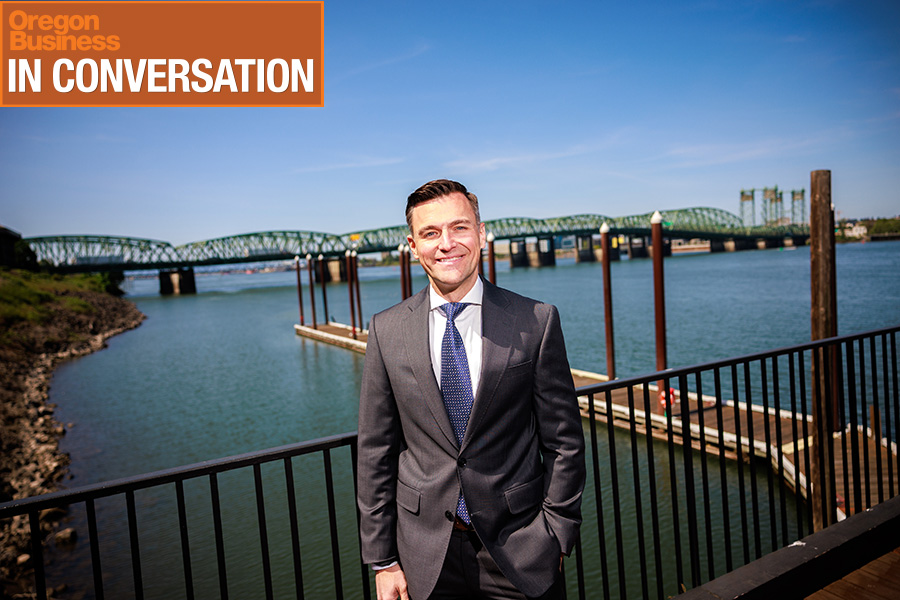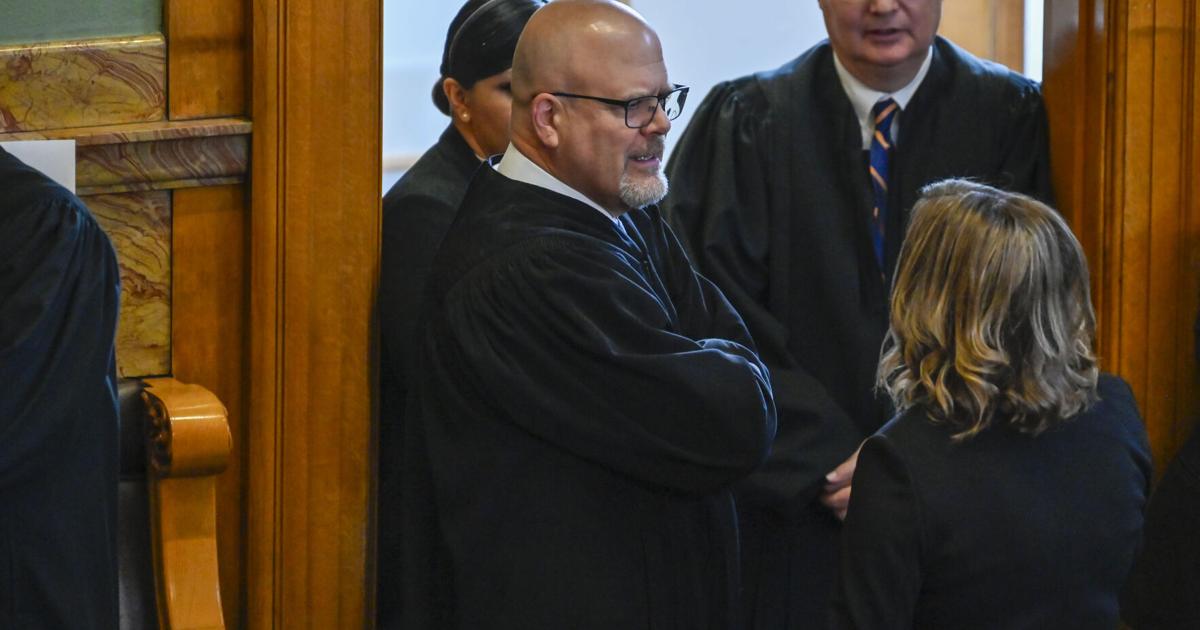
Rayfield’s office has filed more than a dozen lawsuits countering Trump administration policies, from tariffs to Americorps cuts
Share this article!
Donald Trump recently concluded what many historians consider to be among the busiest first 100 days in presidential history, firing off 141 executive orders and working to radically reshape the federal bureaucracy.
Closer to home, Oregon’s new attorney, Dan Rayfield, also had a busy first 100 days. Much of that involved countering Trump administration policies on the national stage (technically, he took over a week early when Ellen Rosenblum left before her term expired). He joined fellow Democratic AGs in a slate of lawsuits — 16 total as of Thursday — opposing Trump’s efforts in such areas as tariffs, cryptocurrency and big cuts to AmeriCorps. Each suit succeeded in drawing a temporary restraining order, pausing the Trump administration’s actions. Trump’s barreling approach to his second term has in fact yielded more than 200 legal complaints from various interests around the country, leaving much of his agenda in the air.
A onetime personal injury attorney, Rayfield served in the House of Representatives beginning in 2015,culminating with the speakership from 2022 to 2024. In last year’s AG race, he cruised to victory over Republican Will Lathrop in November, having campaigned on prosecuting drug dealers, protecting abortion access and joining federal lawsuits to protect environmental resources.
So far in office, Rayfield has split time at the AG’s offices in Portland and Salem, which is closer to his home in Corvallis. He’s planned a number of town hall events around the state to discuss federal cuts with constituents.
During a recent visit to Portland, Rayfield talked about priorities, strategy and democratic foundations.
This interview has been edited for length and clarity.
With so much happening so fast, how do you decide what to focus on?
Anyone in any job like this is entirely dependent upon all the people around them, right? And I’m very fortunate to have really good people around me, and that really allows us to accomplish our broad overarching goals.
When I was running for office, there were three things: How do you keep communities safe? How do we protect working families, seniors and consumers, and expand the work that we’re doing there? And the third thing … was protecting Oregonians values and the values of the state. And under the Trump administration, that’s really taken center stage. There’s been a tremendous partnership between Democratic attorneys general to make sure that the Trump administration is following our Constitution and following the laws of this country.
A lot of the issues that we’re honed in on are real obvious things that all Oregonians would agree upon. When you’re looking at the tariffs lawsuit, that’s something that impacts every Oregonian. It impacts everyone with a natural gas bill. It impacts every Oregonian when they go to the grocery store, or when they go to buy clothes or the everyday goods that households have to buy. It impacts our universities. It impacts the state government. We want to have a transportation package, and to think that Trump’s tariffs aren’t going to impact what we’re able to accomplish with infrastructure is a fallacy.
So really, the overarching value for us as we’re looking at these things is, we have to hold every executive — Democrat or Republican — to the baseline of following the Constitution and the rule of law.
With so much attention on national issues, do you worry you could lose focus on Oregon and Oregon’s issues?
Absolutely not. When I ran, I was incredibly clear about the things we wanted to do coming in. I believe that this other work is incredibly important, and you have to work extra hard to make sure that you’re firing on all cylinders in this federal accountability space. But at the same time there’s absolutely no way, shape or form that I’m going to drop my focus on improving public safety … and I’m working really hard to do more in that space. And it’s why we have an increased focus on consumer protection and protecting working families.
If you’re going to be an attorney general who serves all Oregonians, you can’t do one thing at the expense of the others. You have to increase your bandwidth to do all of it. And again, it goes back to the staff. You can’t ignore that we have people at the Department of Justice who are working overtime to be able to do some of these things. We wouldn’t be able to fire on all cylinders and focus on three different fronts while doing the day-to-day work without incredibly committed people at the Department of Justice.
This is kind of a practical question. When you sign on to one of these big federal lawsuits, what does that actually involve? Is there a greater time commitment upfront? Do you have to do more work on a lawsuit later on? How does that work?
There’s different types of engagement in the lawsuits. You could be forecasting issues that may come up and do research on the front end. Then once something becomes ripe in a case, you can be ready to take action right now. Then there are conversations about which states are going to take the lead. So you may have led in the research and maybe that contributes to the cause.
Sometimes you’ll have three different lead states and they’re all sharing different responsibilities. Most states are contributing in one way or another. In lawsuits where we may not be the ones in the courtroom arguing a case, we still provide factual allegations and work with our agencies to show the impact in Oregon. And in all of these lawsuits you’ll see allegations and declarations from the state of Oregon about the harm that is being caused to Oregonians and our state.
Then there are other cases where you’re more actively engaged, where you’re a co-participant in leading the case, or you are the lead case. So a good example where we’re the lead state is the tariff lawsuit. We developed the complaint, did all the research, from soup to nuts. We worked on that, then we worked with a couple other states to hear what they were thinking about, and amended the complaint. We organized other AGs to join the complaint, and at the same time worked with those states to understand what the harms are in those states so we can then incorporate those allegations.
So again, it depends on the given case and how we’re impacted, and where we fall in the spectrum of different states. We each have different resources. So California and New York have different resources than say Rhode Island or Oregon.
There’s talk on the left, as ever, that Democratic Party leadership needs to do more. Do you think more should be done at the party level to counter Trump?
I don’t honestly think about the party-level response. When I think about, what as a society, as a country founded in democracy and rooted in the Constitution — what is our responsibility as citizens in an environment like this? And it doesn’t matter if it’s a Republican president and it doesn’t matter if it’s a Democratic president.
When you’re trying to accomplish an agenda, you have to follow the Constitution, you have to follow our laws. That’s something we’re all taught in grade school. I think it doesn’t matter who you are, independent, Democrat or Republican, that’s something that we all agree upon. And right now, I think it’s incumbent upon all of us to hold the president and his administration accountable.
The president is an incredibly powerful person. They have the power to do a lot of things, legally. And they can do that, and they should be able to do that. But some of the things they’re trying to do right now — and the manner in which they’re doing them — it’s as though the president and Congress and the judiciary are all one. And this is where I think we as a democracy, if we care about the long-term foundation of our country, that’s where we have to draw the line That going back to the times of the monarch, right? That’s going back to England. And we’ve moved away from that for very good reasons.
I have a certain lane as Attorney General of the Department of Justice that needs to be fulfilled. You have members of Congress who have their role and responsibility. I think the challenge that we see in society right now is that we are so party-driven, Democrats and Republicans, that it becomes difficult to speak out against it.
And instead what you’re hearing now — I think even Rand Paul was talking about it -— you hear people grumbling about the president’s actions. But they are unwilling, because of political consequences, to step up and say what they really feel. And that’s a problem.
You’ve held a number of town halls with constituents. What overall messages are you hearing from voters?
A couple of things. One, there’s an incredible amount of uncertainty. And the uncertainty ripples out into how people are acting in their community. If you’re a federal employee, the uncertainty about your job ripples out in having recruiting and retention issues and in terms of having an unstable federal workforce, which then ripples into a lot of the essential services, whether that’s Social Security, Medicaid, grants from the USDA into the state and communities. So you see all of these things really manifest themselves at different levels.
One really good example of uncertainty that we heard is in Arizona. Farmers there planted crops based on grant money they’d receive for food assistance. And that grant funding is being threatened. These federal farmers have planted crops and it’s impacting the distributor chain, and it’s impacting people who actually need the food.
If you had to narrow it down, what bothers you most about Trump 2.0?
I put this in two categories. There’s the impact on people. And then the second category is the attacks on the foundation of our democracy. And that latter one, will have an impact for generations.
I try to stay in an optimistic space. I believe in Oregonians and the citizens of the United States. It’s ingrained in us: You follow the Constitution. That’s the hope that I have in the back of my head. But some of the stuff that is going on is reminiscent of the reasons we had to put the Constitution in place in the first place.
Those are the things that keep me up and concern me. When you have Congress considering bills that basically take US citizens and remove them out of the country, that is incredibly bothersome on so many different levels. And that is an understatement of how I feel.
Click here to subscribe to Oregon Business.



